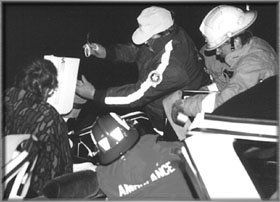 Monitor for TBI
Monitor for TBI
There is a increased probability of misdiagnosis of traumatic brain injury in severe accidents, especially if there has been other serious or obvious injuries. The first responders should monitor for TBI. Many times they are mostly or only concerned with the obvious physical injuries. Brain injury is not as obvious and may not be obvious at all. If the medical professionals do not monitor for TBI, the condition may increasingly become more catastrophic.
The more serious the other injuries the more likely that there will be a traumatic brain injury. There is a direct relationship between the existence of other serious injuries and the likelihood of traumatic brain injury. The amount of force it takes to break a bone, or injure the spinal cord, is enough to injure the brain. That also goes for the force that it takes to lacerate a face could also be enough to cause brain injury. But there tends to be an inverse relationship between the seriousness of other injuries and the diagnosis of traumatic brain injury. If a person is bleeding or has obvious trauma, the emergency personnel will often be distracted from the careful analysis needed to identify a brain injury. Thus, brain injury will go undiagnosed and treatment will be delayed.
The first priority of the ER is to save the life. That should be paramount. Dealing with life changing traumatic brain injury needs also to be taken more seriously. When it is clear from the seriousness of the other injuries, that this person was a risk for a brain injury. Therefore the person is not getting the treatment that they need. Not recognizing the fact that the person could have incurred a traumatic brain injury may cause more complications down the road.

